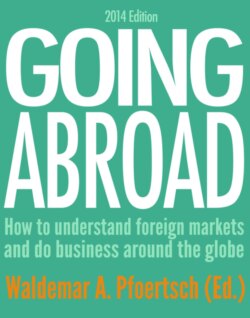Читать книгу Going Abroad 2014 - Waldemar A. Pfoertsch - Страница 20
На сайте Литреса книга снята с продажи.
Оглавление1 Going into foreign business – reasons and obstacles
It is not rare today for a company to want to go international and expand to different countries. Companies go international for a variety of reasons, but the goal is typically company growth or expansion. Whether a company hires international employees or searches for new markets abroad, an international strategy can help diversify and expand a business.
1.1 Reasons for going international
One very important reason for going global is for a firm to explore and develop new markets. In the ideal case this would be followed by an increase of sales revenues. Going abroad is sometimes the only way to develop new profit centers with increased sale of products or services. A company can compete effectively in the global marketplace and be in a much better position, both at home and abroad, in maintaining the competitive edge. It has the possibility to build and strengthen relationships with the counterpart organizations overseas, and once it has established itself and found businesses and partners to work with, it is much easier to exchange ideas and expertise on a global level. There is a good chance to gain industrial expertise and experience from strategic alliances, partnerships, or memberships.
1.1.1 Wrong reasons
Some reasons appear very reasonable and promising at first, but they could be the wrong reasons to go abroad. Do not go international and choose a country because it has a large population. This does not necessarily mean a big market for your company. First of all, there may not be enough skilled workers to hire to do the work your company needs. Infrastructure needs to be checked carefully to see if the system of education and the academic and technical knowledge that is offered are sufficient. It would not be wise to have to invest a huge sum just to get the right infrastructure for your manufacturing and marketing. Not even cheap labor can make up for these huge investments.
Secondly, marketing studies must show that consumers are willing and able to buy the services and products offered. It is much easier to meet a need that already exists than to create the need. Thirdly, do not blindly follow another company going into a foreign market, with the attitude that if they can do it, you could also. Each company should follow its own business strategy.
1.2 Obstacles
Once established abroad, the biggest obstacle to success presents itself – dealing with cultural differences. Despite what seems to be adequate cross-cultural training, the surprises and challenges that emerge can be quite morally discouraging and financially costly. Potential consumers may not have been evaluated correctly; competition may prove to be stiffer, local staffing may prove to be difficult. Some surprises can be quite out of one’s control: natural disasters, government changes – a company must be prepared for all of the above.
